tooeitheralsoaswell辨析及测试题
also too either as well的区别和用法
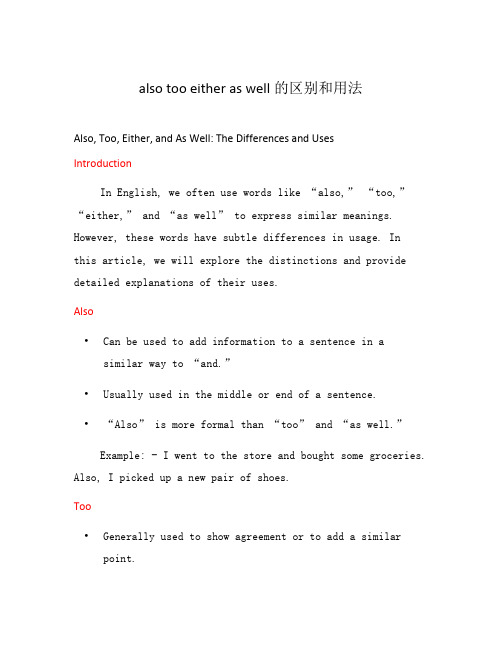
also too either as well的区别和用法Also, Too, Either, and As Well: The Differences and UsesIntroductionIn English, we often use words like “also,” “too,” “either,” and “as well” to express similar meanings. However, these words have subtle differences in usage. Inthis article, we will explore the distinctions and provide detailed explanations of their uses.Also•Can be used to add information to a sentence in a similar way to “and.”•Usually used in the middle or end of a sentence. •“Also” is more formal than “too” and “as well.”Example: - I went to the store and bought some groceries. Also, I picked up a new pair of shoes.Too•Generally used to show agreement or to add a similar point.•Used at the end of a sentence, following the subject. •Has a less formal tone compared to “also” and “as well.”Example: - She is going to the party tonight. I’m going too.Either•Used in a negative or alternative context.•Followed by “or” when presen ting a choice between two options.•Used when presenting options that are mutually exclusive.Example: - I don’t eat chocolate. I don’t like it either.As Well•Similar to “also” and “too” in meaning but is less commonly used.•Usually used at the end of a sentence.•Has a more formal tone than “too.”Example: - He plays the guitar. He sings as well.Summary•“Also” is formal, used to add information.•“Too” shows agreement or similarity.•“Either” presents negative or alternative op tions. •“As well” is a formal alternative to “also” and “too.”Remember, understanding the nuances of these words will help you convey your thoughts more accurately and effectively in English. Practice using them in various contexts to become more proficient in their usage.Additional Uses and ExamplesNow, let’s delve deeper into the uses of “also,” “too,” “either,” and “as well” by providing more examples and explanations.Also•“Also” can be used to add information to a sentence, similar to “and.”–Example: She loves to dance. She also enjoyspainting.•It is often used in the middle or end of a sentence.–Example: He studied hard for the exam. He also attended review classes.•“Also” is more formal than “too” and “as well.”–Example: She is not only talented but alsohardworking.Too•“Too” is used to show agreement or to add a similar point.–Example: Sarah is coming to the party. I’m coming too.•It is usually used at the end of a sentence, following the subject.–Example: I like ice cream too.•“Too” has a less formal tone compared to “also” and “as well.”–Example: He loves football too.Either•“Either” is used in a negative or alternative context.–Example: I don’t eat meat. I don’t eat fisheither.•It is followed b y “or” when presenting a choice between two options.–Example: You can either go to the movies or stay at home.•“Either” is used when presenting options that are mutually exclusive.–Example: You can either come with us or stay here alone.As Well•“As well” is similar in meaning to “also” and “too,”but it is less commonly used.–Example: They are talented singers. They are actors as well.•It is usually used at the end of a sentence.–Example: We will be attending the conference. We will be presenting our research as well.•“As well” has a more formal tone than “too.”–Example: He can swim. He can dive as well.ConclusionIn conclusion, while “also,” “too,” “either,” and “as well” have similar meanings, they have distinct uses and nuances. Understanding their differences will enable you to express yourself more precisely in English. Remember to practice using these words in various contexts to enhance your fluency and accuracy in conveying your ideas.。
tooalsoaswelleither的区别

tooalsoaswelleither的区别too also as well either的区别:too作为副词,意为太、过于,用于形容词和副词前;also作为副词,意为而且、也,放在行为动词之前,特殊动词之后;as well意为也、还,常位于句末;either可作代词和副词,意为任何一个、要么要么,常用于否定句,且放句末。
一、too的基本含义及用法介绍too作为副词,意为(用于形容词和副词前)太,过于,过度;也;又;还;(评说某事物使情况更糟)而且。
例句:He's far too young to go on his own.他年纪太小,不能独自一人去。
Can I come too?我也可以来吗?She broke her leg last week─and on her birthday too!她上星期把腿摔断了,而且还是在她生日那一天!I'm not too sure if this is right.这是否正确,我没有太大把握。
二、also的基本含义及用法介绍also作为副词,意为而且;此外;也;同样。
例句:She was not only intelligent but also very musical.她不仅聪明,而且极具音乐天分。
I didn't like it that much. Also, it was much too expensive. 我并不怎么喜欢它。
再说它太贵了。
She's fluent in French and German. She also speaks a little Italian.她的法语和德语讲得流利,也会说一点意大利语。
三、as well的基本含义及用法介绍as well意为也、还。
例句:They sell books as well as newspapers.他们既卖报也卖书。
also too either as well的区别和用法

also too either as well的区别和用法(实用版)目录1.引言2.also, too, either 和 as well 的含义和用法的区别3.also 和 too 的用法4.either 的用法5.as well 的用法6.总结正文一、引言在英语中,副词"also", "too", "either"和"as well"经常被用来表示不同的意思。
尽管它们在某些情况下可以互换使用,但它们之间仍然存在一些关键的差异。
在本文中,我们将详细讨论这些差异以及如何正确使用这些副词。
二、also, too, either 和 as well 的含义和用法的区别1.also:也,用于表示某个观点或行为也适用于另一个观点或行为。
例句:I like apples and I also like oranges.(我喜欢苹果,我也喜欢橙子。
)2.too:也,用于表示强调,通常放在句尾。
例句:I am very tired, too.(我也非常累。
)3.either:(两者之中)任何一个,用于表示两者之间的选择。
例句:You can choose either a book or a magazine.(你可以选择一本书或一份杂志。
)4.as well:也,用于表示某个观点或行为同样适用于另一个观点或行为。
通常放在句尾。
例句:She is a great dancer and a great singer as well.(她是一名优秀的舞者,同时也是一名优秀的歌手。
)三、also 和 too 的用法1.also:用于句中,表示两个观点或行为之间的联系。
例句:He is a talented artist and he also plays the piano.(他是一名有才华的艺术家,而且他也会弹钢琴。
)2.too:用于句尾,表示强调。
also too either as well的区别和用法(一)
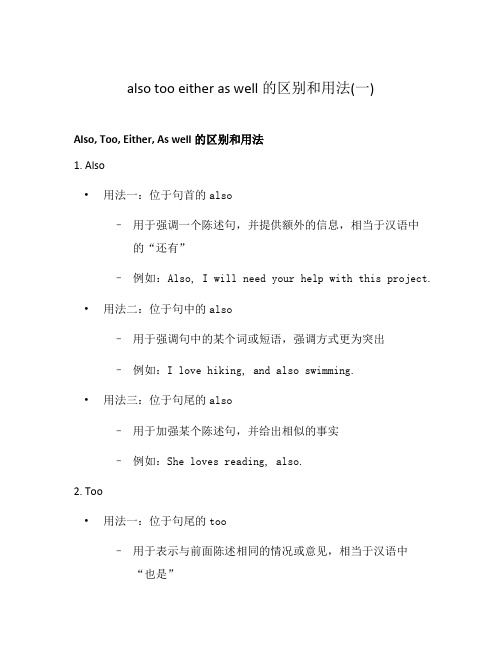
also too either as well的区别和用法(一)Also, Too, Either, As well的区别和用法1. Also•用法一:位于句首的also–用于强调一个陈述句,并提供额外的信息,相当于汉语中的“还有”–例如:Also, I will need your help with this project. •用法二:位于句中的also–用于强调句中的某个词或短语,强调方式更为突出–例如:I love hiking, and also swimming.•用法三:位于句尾的also–用于加强某个陈述句,并给出相似的事实–例如:She loves reading, also.2. Too•用法一:位于句尾的too–用于表示与前面陈述相同的情况或意见,相当于汉语中“也是”–例如:I am tired, too.•用法二:位于句中的too–用于强调句中某人或某物和其他人或物一样–例如:He, too, has a dog.3. Either•用法一:位于句尾的either–用于在否定句中表示两种选择中的任何一种–例如:I don’t like tea, either.•用法二:either…or…–用于表示两种选择之间的关系,相当于汉语中的“要么…要么…”–例如:You can either study or play games.4. As well•用法一:位于句尾的as well–用于表示除了前面提到的情况之外,还有另外一项–例如:I like cooking and gardening as well.•用法二:as well as–用于列举一系列事物时,表示“还有…以及…”–例如:He is good at playing soccer as well asbasketball.以上是also, too, either, as well的常见用法及区别。
通过合理运用这些词语,可以使你的表达更加准确明确。
too also either as well as well as

too;also;either;as well ;as well as A.too 是个常用词,多用于口语,语气较随便。
一般用在肯定句中,放在句末,或作为插入语放在句中。
例如:I'm in Row 1,too.我也在第一排。
She,too,is a singer.她也是一位歌唱家。
B.also 是比较正式的用语,语气较庄重。
它经常放在句中,位于行为动词之前;位于系动词,助动词或情态动词之后。
例如:Mrs Green can also sing the song in Chinese.格林夫人也能用汉语唱这首歌。
They also have fish shops in that small town.那个小镇上也有鱼店。
C.either 表示“也”时一般只用于否定句,且只置于句末。
例如:I don't know him.Tom doesn't know him,either.我不认识他,汤姆也不认识他。
If you don't go there,he won't go there,either.如果你不去那儿,他也不去那儿。
D.as well 常用于口语,用法和too一样,通常位于句末,它前面通常不用逗号。
例如:She is a teacher and a singer as well.她是教师,也是歌唱家。
I know Japanese as well.我也懂日语。
【巩固练习】1.用too,also,either或as well填空:1)I'll go to see the film,.2)If you don't come here,I shouldn't,.3)I,,will help him.4)Jack can speak Chinese,and his brother can speak Chinese.5)He knows Chinese .as well与as well as一. as well 用法:1. as well常用作状语, 作“又;也”解, 相当于too或also, 常位于句末, 无须用逗号与句子分开。
also,too 和 either 的用法区别练习
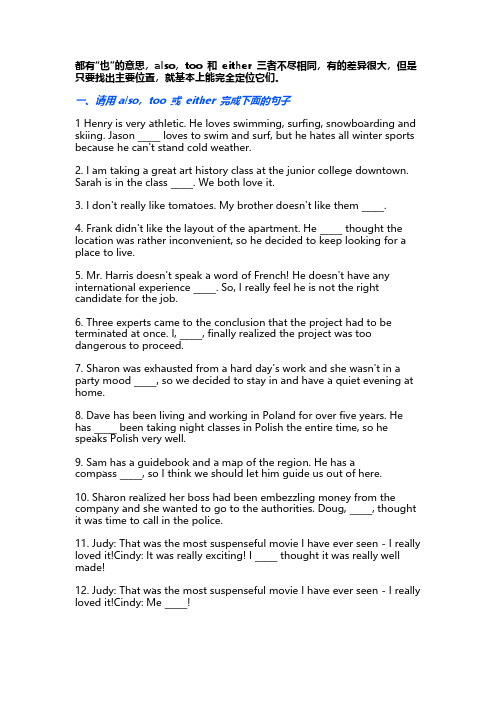
都有“也”的意思,also,too 和either 三者不尽相同,有的差异很大,但是只要找出主要位置,就基本上能完全定位它们。
一、请用 also,too 或either 完成下面的句子1 Henry is very athletic. He loves swimming, surfing, snowboarding and skiing. Jason _____ loves to swim and surf, but he hates all winter sports because he can't stand cold weather.2. I am taking a great art history class at the junior college downtown. Sarah is in the class _____. We both love it.3. I don't really like tomatoes. My brother doesn't like them _____.4. Frank didn't like the layout of the apartment. He _____ thought the location was rather inconvenient, so he decided to keep looking for a place to live.5. Mr. Harris doesn't speak a word of French! He doesn't have any international experience _____. So, I really feel he is not the right candidate for the job.6. Three experts came to the conclusion that the project had to be terminated at once. I, _____, finally realized the project was too dangerous to proceed.7. Sharon was exhausted from a hard day's work and she wasn't in a party mood _____, so we decided to stay in and have a quiet evening at home.8. Dave has been living and working in Poland for over five years. He has _____ been taking night classes in Polish the entire time, so he speaks Polish very well.9. Sam has a guidebook and a map of the region. He has acompass _____, so I think we should let him guide us out of here.10. Sharon realized her boss had been embezzling money from the company and she wanted to go to the authorities. Doug, _____, thought it was time to call in the police.11. Judy: That was the most suspenseful movie I have ever seen - I really loved it!Cindy: It was really exciting! I _____ thought it was really well made!12. Judy: That was the most suspenseful movie I have ever seen - I really loved it!Cindy: Me _____!13. I am really tired, and I don't feel like going out tonight _____. Let's just stay home tonight.14. I don't really feel like going out tonight, and I am _____ really tired. Let's just stay home tonight.15. Jim is an amazing skiier, and he loves to snowboard _____.二、答案、参考翻译及解析1. also亨利很有运动天赋。
too also either aswell

• [巩固训练]选择正确答案: • 1. He is ___________________ saying,“I don”t want any bread, ___________________.” • A. too, also B. also, too • C. either, too D. also, either • 2. I _________________ study English and Russian. • A. too B. also C. either D. as well • 3. Not only the children but ________________ their father is in town. • A. too B. also C. either D. as well • 4. John _____________ believes that bears hibernate in winter ________________. • A. also, either B. too, as well • C. also, as well D. as well, too • 5. The foreigner can speak English, he can speak French __________________. • A. neither B. also C. either D. as well
• 二. either:用于否定句中,表示前者不……, 后者也不……,其位置一般放在句尾。例如: • He doesn”t want any coffee, and I don”t want any, either. • You don”t know the way and I don”t know it, either.
also,too 和 either 的用法区别习题(答案及解析)

三者都有”也“的意思,其中 also 和 too 可以以相同的方式使用。
然而,我们把它们放在不同的地方,在肯定句中使用 also 和 too,而在否定句中则使用 either。
其中,also 放在 be 动词和在情态动词之后,实义动词之前,而 too 放在句尾,此时它的意思跟 also 一样,所以解答此类的题目,只需判断句型或位置就可以了。
一、用 also,too 或 either 完成下列句子1、I don’t like cold climates. I don't think you like it _____.2、My friends are going to college next year. I am _____ going to college next year.3、My wife is a diligent engineer. I am a diligent engineer _____.4、I love swimming. My son loves it _____.5、Today the weather isn't so good. It wasn't really good yesterday _____.6、I eat a lot more than an average person. My brother _____ eats a lot.7、A bear can run very fast. A tiger runs very fast _____.8、I am not from Italy. My friend isn't from Italy _____.9、Paris is a big city. Madrid is _____ a big city.10、French is a difficult language to learn. Latin is a difficult language to learn _____.11、Henry is very athletic. He loves swimming, surfing, snowboarding and skiing. Jason _____ loves to swim and surf, but he hates all winter sports because he can't stand cold weather.12、I am taking a great art history class at the junior college downtown. Sarah is in the class _____. We both love it.13、I don't really like tomatoes. My brother doesn't like them _____.14、I am really tired, and I don't feel like going out tonight _____. Let's just stay home tonight.15、I don't really feel like going out tonight, and I am _____ really tired. Let's just stay home tonight.二、答案及解析1、either解析:在否定句(don't)中用 either。
also,too,aswell,either的区别和用法-完整版课件
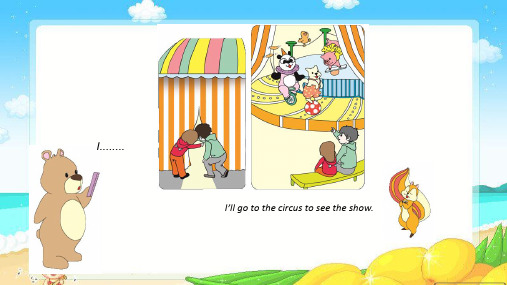
= Jim wants to go swimming and Sarah also
to go swimming.
either: 用于否定句。放句末。 表示前者不,后者也不。
1. He
want any coffee, and I don't want any, either.
2. I speak French, John can't speak French, either.
I........
I’ll go to the circus to see the show.
also, too, as well, either
的区别和用法
also, too, as well :“也”, 放于肯定句或疑问句中。
too和as well :多用于口语,放句末。 可用逗号隔开, 也可不用。
2.My father is a teacher,my mother is a teacher too/as well. =My father is a teacher, my mother also a teacher.
3.Jim wants to go swimming and Sarah wants to go swimming too/as well.
1.Are they coming
?
2.You will go shopping and I will go shopping,
3.My father is a teacher,my mother is a teacher
.
too : 也用于简略回答中。 比如:Me too.(我也是)
eg. Jim wants to go swimming with his friend. ---- Me too.
also too either as well的区别和用法

also too either as well的区别和用法摘要:1.介绍also, too, either 和as well 的含义和用法2.区分also, too, either 和as well 之间的差异3.提供实例说明这些词的用法4.总结这些词的用法和注意事项正文:一、also, too, either 和as well 的含义和用法1.also:用于肯定句中,表示“也”,“同样”2.too:用于肯定句中,表示“也”,“同样”3.either:用于否定句和疑问句中,表示“也不”,“任何一个”4.as well:用于肯定句和否定句中,表示“也”,“同样”二、区分also, too, either 和as well 之间的差异1.also 和too 的用法相似,都表示“也”,“同样”,但是also 用于较为正式的场合,而too 更常用于口语中。
2.either 用于否定句和疑问句中,表示“也不”,“任何一个”,而also 和too 只能用于肯定句中。
3.as well 用于肯定句和否定句中,表示“也”,“同样”,与also 和too 的用法类似,但是as well 可以放在句首、句中和句末。
三、实例说明这些词的用法1.also 的用法:I like apples and oranges.I also like bananas.(我也喜欢香蕉。
)2.too 的用法:She likes apples and oranges.She also likes bananas.(她也喜欢香蕉。
)3.either 的用法:I don"t like apples.I don"t like oranges either.(我也不喜欢橙子。
)4.as well 的用法:I like apples, oranges, and bananas as well.(我也喜欢香蕉。
)四、总结这些词的用法和注意事项1.also, too 和as well 的用法相似,都表示“也”,“同样”,但是它们在不同语境下的使用频率和场合有所不同。
also, too, as well, either的区别、用法及测试题(含答案)

also, too, as well, either的区别、用法及测试题also, too, as well, either中文都有“也”的意思。
also, too, as well都只用在肯定句之中,只是在句中所用的位置不同。
而either只用在否定句之中。
下面是结合例句的详细讲解。
1.also, 用于肯定句中,表示“也”的意思。
如:Jane speaks French. Sam also speaks French.He loves chocolate. I also love pizza.Frank can come with us. Nancy can also come with us.also在句子中的位置,主要有四种情况:(1) 放在be动词之后。
如:I am also Canadian.I was also there.(2) 放在实义(行为)动词之前。
如:I also sing.He also helped us.(3) 放在助动词、情态动词之后。
如:I have also been to Hong Kong.I am also studying economics.I can also speak French.I should also be there.(4) 放在句首,用逗号隔开,表示强调。
如:It’s very humid. Also, you can easily get sunburnt.It is a small house. Also, it needs a lot of repairs.2.too, 用于肯定句中,表示“也”的意思。
如:Jane speaks French. Sam speaks French too.I love chocolate. I love pizza too.Frank can come with us. Nancy can come with us too.too, 在句子中的位置,主要有两种情况。
either,-also,-too,-as-well用法练习题

练习题练习1:用also, too, either,as well填空:1. I don’t like cold climates. I don't think you like it _________ .2. My friends are going to college next year. I am going to college next year _______ .3. My wife is a diligent engineer. I am a diligent engineer _______ .4. I love swimming My son loves it __________ .5. Today the weather isn't so good. It wasn't really good yesterday_________ .练习2:选择1. After learning the lesson above, you shouldn’t make such a mistake and he shouldn't _______ .A. tooB. as wellC. eitherD. also2. My friend Christian’s a very good cook; and he’s a very good athlete __________.A. tooB. as wellC. eitherD. also3. He didn’t thank me for the sumptuous meal, and you didn't ________ .A. tooB. as wellC. eitherD. also4. Sheila won’t tell you anything about her diet, and I won't ________ .A. tooB. as wellC. eitherD. also5. On holiday, fish was cheap, and potatoes were inexpensive ________ . The rest was unaffordable!A. tooB. alsoC. eitherD. and too6. In a small restaurant, the forks weren’t clean, and the knives weren't _______ .A. tooB. as wellC. eitherD. also7. My friend spoke English and he spoke German as _________ .A. and tooB. as wellC. eitherD. also8. Their youngest daughter is a vegan _________ .A. and tooB. as wellC. eitherD. also9. The fruit crops are ________ good this year, I saw so many orchards...A. also tooB. as wellC. eitherD. also10. Not only children, but grown-ups ________ like climbing mountains.A. also tooB. as wellC. eitherD. too。
as well,either,also,too的区别

as well, either, also, too的区别1.also用于肯定句,既可表示两人干了同样的事,也可表示一个人干了两件事,通常位于be动词,助动词或情态动词之后,行为动词之前。
如:He has been to Beijing. I have also been there.他去过北京,我也去过。
He is good at English. He is also good at Japanese.他擅长英语,也擅长日语。
I also wants some tea.我也要点茶。
注意:表示强调时,also也可放在助动词或情态动词等之前。
比较:I can also do it.我也能干。
I also can do it.(同上)2.too也用于肯定句,比also更通俗,和also, as well可以相互替换,可放在句中,也可放在句末。
如:Xiao Li went to Beijing and Xiao Zhao, too, went to Beijing.小李到北京去了,小赵也到北京去了。
He studies hard and I study hard, too.他学习用功,我(学习)也用功。
3.either用于否定句,而且只能放在句末。
如:He didn’t know it.I didn’t know it either.他不知道那件事,我也不知道。
I can’t speak French and can’t write it, either.我不会讲法语,也不会写法语。
4.as well在口语中用得很多,用法和too完全一样,可以互换,通常位于句末。
[见as well, as well as条]。
如:She not only sings,she plays the piano as well.她不但会唱歌,而且会弹钢琴。
I can do it as well.这事我也能做。
5.在含有责备、抱怨或规劝之类的句子中,若句子本身是以否定的形式表达肯定的意义时用“too”,而不用“either”。
also, too, as well, either的区别、用法及练习题(附答案)

also, too, as well, either的区别、用法及练习题1.also, 用于肯定句中,表示“也”的意思。
如:Jane speaks French. Sam also speaks French.He loves chocolate. I also love pizza.Frank can come with us. Nancy can also come with us.also在句子中的位置,主要有四种情况:(1) 放在be动词之后。
如:I am also Canadian.I was also there.(2) 放在实义(行为)动词之前。
如:I also sing.He also helped us.(3) 放在助动词、情态动词之后。
如:I have also been to Hong Kong.I am also studying economics.I can also speak French.I should also be there.(4) 放在句首,用逗号隔开,表示强调。
如:It’s very humid. Also, you can easily get sunburnt.It is a small house. Also, it needs a lot of repairs.2.too, 用于肯定句中,表示“也”的意思。
如:Jane speaks French. Sam speaks French too.I love chocolate. I love pizza too.Frank can come with us. Nancy can come with us too.too, 在句子中的位置,主要有两种情况。
如:(1)放在句子末尾,可以用逗号隔开,也可以不用逗号隔开。
如:David is a teacher. His wife is a teacher, too. (用逗号隔开)David is a teacher. His wife is a teacher too. (不用逗号隔开)I can speak French too.I am studying economics too.If he wants to go too, he should meet us at 8:00.(2)插入句子中。
英语中“也”的用法

1.also, too, either, as wellalso,too,either和aswell都含有“也"的意思,在句中作状语。
但用法各异。
also 用法比较正式,含较庄重色彩,只能用于肯定句中,不与否定式动词连用。
通常用于主要动词之前,助动词之后,但若主要动词是be,则置于其后。
例如: I was at her birthday party, and he was also there.我参加了她的生日聚会,而他也参加了。
She not only plays well, but also writes music.她不仅很会演奏,而且还会作曲。
I've met Jane and I've also met her mother.我已见到简,我也见到了她的母亲。
too常用于口语中,且语气较轻。
可与also通用,但不如also 正式。
用于肯定句,通常置于句末,但要用逗号将前后两部分隔开。
作插人语时置于句中。
例如: YouknowthewayandIknowit,too.你知道路,我也知道。
He plays the guitar and sings,too.他会弹吉他,也会唱歌。
Mr. Smith has expressed his support. I, too,willdo what I cando for you.史密斯先生已表示支持你们,我也将为你们做出我能够做的一切。
-Me, too!我也有了!either只能用于否定句,含...也(不)”的意思。
在否定句中,用no.t--either 表示这种增加的成分。
常放在从句最后面,有时置于句中,表示强调,但不能置于句首。
例如:They haven't phoned and they haven’t written either.他们没来过电话,而且也没来过信。
I don't like this hat, and I don't like that oneeither.我既不喜欢这顶帽子,也不喜欢那顶帽子。
《alsotooaswelleither的区别》优秀教案
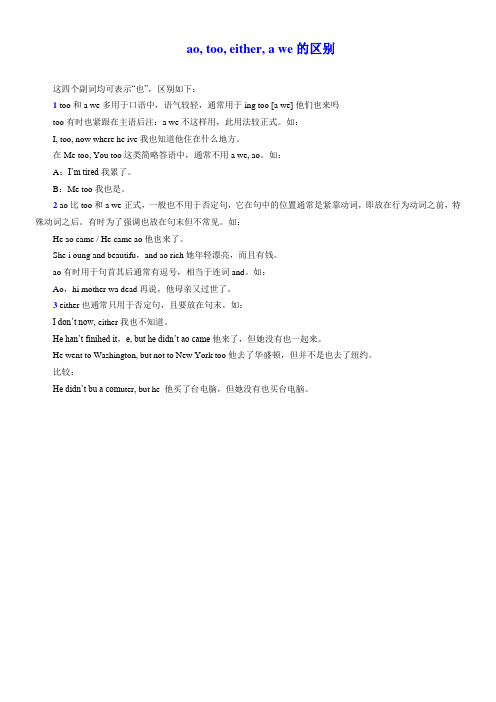
ao, too, either, a we的区别这四个副词均可表示“也”,区别如下:1 too 和 a we 多用于口语中,语气较轻,通常用于ing too [a we] 他们也来吗too 有时也紧跟在主语后注:a we 不这样用,此用法较正式。
如:I, too, now where he ive 我也知道他住在什么地方。
在 Me too, You too 这类简略答语中,通常不用 a we, ao。
如:A:I’m tired我累了。
B:Me too 我也是。
2 ao 比 too 和 a we 正式,一般也不用于否定句,它在句中的位置通常是紧靠动词,即放在行为动词之前,特殊动词之后。
有时为了强调也放在句末但不常见。
如:He ao came / He came ao 他也来了。
She i oung and beautifu,and ao rich 她年轻漂亮,而且有钱。
ao 有时用于句首其后通常有逗号,相当于连词 and。
如:Ao,hi mother wa dead 再说,他母亲又过世了。
3 either也通常只用于否定句,且要放在句末。
如:I don’t now, either 我也不知道。
He han’t finihed it,e, but he didn’t ao came他来了,但她没有也一起来。
He went to Washington, but not to New York too 他去了华盛顿,但并不是也去了纽约。
比较:He didn’t bu a com uter, but he 他买了台电脑,但她没有也买台电脑。
